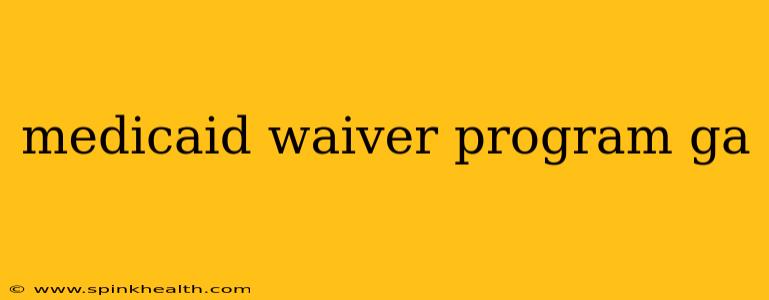The Georgia Medicaid Waiver Program offers a lifeline to thousands of Georgians needing long-term care but lacking the financial resources to cover it. It's a complex system, however, and understanding its intricacies can be daunting. This guide aims to demystify the process, answering common questions and providing valuable insights for those seeking assistance.
Imagine Sarah, a 70-year-old with Alzheimer's disease. Her family struggles to provide the around-the-clock care she needs. The cost of nursing homes is prohibitive, and Sarah's savings are dwindling. Enter the Georgia Medicaid Waiver Program – a potential solution that allows Sarah to receive care at home or in a community-based setting, easing the financial burden and improving her quality of life. But what exactly is a Medicaid waiver?
What is the Georgia Medicaid Waiver Program?
The Georgia Medicaid Waiver Program is a state-administered program funded by both the state and federal governments. It allows individuals who meet specific eligibility criteria to receive long-term care services in their homes or in community-based settings instead of nursing homes. The “waiver” part refers to the waiver of certain Medicaid requirements, allowing for greater flexibility in the types of services provided and the settings where they are delivered. This flexibility is crucial for tailoring care to individual needs.
Who is Eligible for the Georgia Medicaid Waiver Program?
Eligibility criteria are quite specific and vary depending on the particular waiver program. Generally, you need to meet certain income and resource limits, be determined to be functionally disabled needing a nursing facility level of care, and meet specific medical criteria. The assessment process is thorough and involves a comprehensive evaluation of your medical, functional, and financial status.
What Services are Covered Under the Georgia Medicaid Waiver Program?
The services covered vary across different waiver programs, but commonly include:
- Personal Care Services: Assistance with bathing, dressing, eating, and other daily tasks.
- Home Health Care: Skilled nursing care, physical therapy, occupational therapy, and speech therapy provided in the home.
- Adult Day Care: Daytime care in a supervised setting offering social interaction, recreational activities, and health monitoring.
- Respite Care: Temporary care for caregivers, allowing them a break from their responsibilities.
- Home-Delivered Meals: Nutritious meals delivered to the individual's home.
- Adult Foster Care: Care in a private home setting.
How Do I Apply for the Georgia Medicaid Waiver Program?
The application process can be complex and time-consuming. It involves completing numerous forms, providing extensive documentation, and undergoing a thorough assessment. It's highly recommended to seek assistance from a qualified healthcare professional or an advocate who is familiar with the program's requirements.
What are the Different Types of Georgia Medicaid Waivers?
Georgia offers several types of Medicaid waivers, each with its own eligibility criteria and service offerings. The specific waiver program you qualify for depends on your individual needs and circumstances. Contacting the Georgia Department of Community Health is crucial to understand the specific waivers and find the one which is most appropriate for your needs.
What Happens After I Apply for the Georgia Medicaid Waiver?
After applying, you'll undergo a comprehensive assessment to determine your eligibility and the appropriate level of care. This process can take several weeks or even months, depending on the demand and your specific circumstances. Once approved, you'll work with a case manager to develop a personalized care plan that addresses your specific needs.
How Can I Find More Information About the Georgia Medicaid Waiver Program?
The best source of information is the Georgia Department of Community Health's website, which provides comprehensive details on eligibility requirements, application procedures, and available services.
The journey through the Georgia Medicaid Waiver Program can be challenging, but with thorough preparation and understanding, it can offer a crucial pathway to receiving essential long-term care services. Remember that seeking guidance from professionals familiar with the program is highly recommended. The information provided here is for informational purposes only and does not constitute legal or medical advice. Always consult with relevant professionals for specific guidance.

